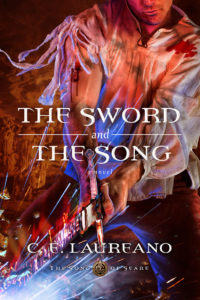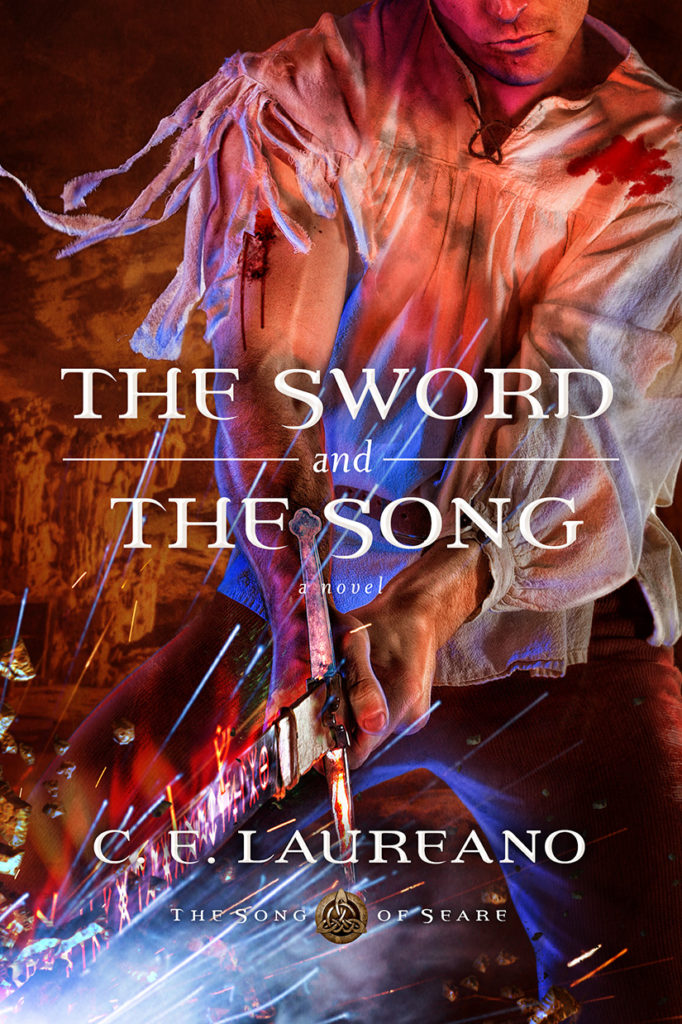Realism and The Christian Artist
 Fantasy fiction has enjoyed an uptick in the mainstream media lately because of the successful transition from page to screen of George R.R. Martin’s Song of Ice and Fire series, the uber-popular Game of Thrones on HBO. However, it’s also brought up a fair bit of controversy in evangelical circles about the suitability of the show’s content for Christian viewers. I was privy to one particular Facebook thread in which a bestselling author posted something tangentially related to Game of Thrones. Many fans immediately jumped on the author for watching “such filth” and called into question this person’s faith and integrity. Some went as far to say they would be boycotting that author’s work in the future because they couldn’t in good conscience support it any longer. Clearly, feelings run high on the subject.
Fantasy fiction has enjoyed an uptick in the mainstream media lately because of the successful transition from page to screen of George R.R. Martin’s Song of Ice and Fire series, the uber-popular Game of Thrones on HBO. However, it’s also brought up a fair bit of controversy in evangelical circles about the suitability of the show’s content for Christian viewers. I was privy to one particular Facebook thread in which a bestselling author posted something tangentially related to Game of Thrones. Many fans immediately jumped on the author for watching “such filth” and called into question this person’s faith and integrity. Some went as far to say they would be boycotting that author’s work in the future because they couldn’t in good conscience support it any longer. Clearly, feelings run high on the subject.
But it brought up the question, why exactly is this show singled out by Christians for such hatred? Is it because of the explicit way the less savory plot details are handled? Or is it the fact that those plot details were included in the first place? The question is important for Christian writers of fantasy (notice I did not say “writers of Christian fantasy”) because it brings up the question, “How realistic can I get when writing fantasy?”
The thing that I personally like about reading and writing fantasy is its visceral nature, its ability to get you wrapped up breathlessly in a story. And yes, I like the violence. Not for violence’s sake, but because having characters in peril has a way of investing you in their story in a way that other conflicts might not. (My contemporary character doesn’t get the job? Bummer. My fantasy hero is about to be tortured by the sadistic villain? I’m chewing my nails.) The fact is, peril described in general terms is not nearly as gripping as having seen exactly what is at stake should the characters fail. Just telling me that the villain is a bad guy doesn’t make me fear for my protagonist in the same way as having seen him destroy a village of innocents. Distasteful, yes. But an effective way of getting readers invested in the hero’s success.
The argument that’s brought up most often at this point is Philippians 4:8 (NIV): “Finally, brothers and sisters, whatever is true, whatever is noble, whatever is right, whatever is pure, whatever is lovely, whatever is admirable—if anything is excellent or praiseworthy—think about such things.” This is often used in the sense that it is our responsibility as Christians to shield ourselves from anything evil or unpleasant. And I agree, to a point. Where this argument breaks down is when you get to those Christians working in downright unpleasant situations: first responders, trauma counselors, relief workers. Would we say that their work is un-Christian because they are exposed to all sorts of evil and depravity in the course of their everyday work? Of course not. In fact, most of us would consider that work to be holy and Christlike.
The difference of course is that the focus in those situations is not the crime or the trauma, but the redemption. The work of helping victims always trumps the fact the helpers must immerse themselves in the dirty and the wretched. This is the key to writing fantasy as Christians, whether or not we’re writing for the Christian market.
What makes the work Christian is not the bad that happens, but the good that comes out of it.
This is actually my one criticism of the Game of Thrones storylines. Not the horrible acts that characters commit or the explicit nature of the filming (though I could do with less of that), but the fact that there is no discernible redemption in the future. In fact, if you’ve kept up with the books or the show, most of the honorable characters meet a painful and untimely end. In that world, nice guys definitely finish last.
 I purposely kept the graphic details to a minimum in my Song of Seare series because I was aware that I would have younger and more sensitive readers. (It was originally marketed as YA but has expanded to include a wider adult readership.) That doesn’t mean, however, that I saved my characters from trouble. There’s imprisonment and torture. Heroes do some very unheroic things. Beloved characters die. What keeps it from being depressing or nihilistic is the understanding that they are fighting for a cause greater than themselves. Although that’s tied to religion and a recognizably Christian faith in my books, it doesn’t have to be. Writers creating work for a general market audience can just as easily create a Christian story by pulling out themes of honor, justice, love, redemption, and self-sacrifice. When someone acts for the greater good against his self-interest, that’s Christ-like behavior, without the name of God ever being uttered. It’s the literary equivalent of witnessing by example.
I purposely kept the graphic details to a minimum in my Song of Seare series because I was aware that I would have younger and more sensitive readers. (It was originally marketed as YA but has expanded to include a wider adult readership.) That doesn’t mean, however, that I saved my characters from trouble. There’s imprisonment and torture. Heroes do some very unheroic things. Beloved characters die. What keeps it from being depressing or nihilistic is the understanding that they are fighting for a cause greater than themselves. Although that’s tied to religion and a recognizably Christian faith in my books, it doesn’t have to be. Writers creating work for a general market audience can just as easily create a Christian story by pulling out themes of honor, justice, love, redemption, and self-sacrifice. When someone acts for the greater good against his self-interest, that’s Christ-like behavior, without the name of God ever being uttered. It’s the literary equivalent of witnessing by example.
—–
 About the Author
About the Author
C.E. Laureano is the RITA® award-winning author of both Celtic fantasy and contemporary romance (as Carla Laureano). A graduate of Pepperdine University, she worked as a sales and marketing executive for nearly a decade before leaving corporate life behind to write fiction full-time. She currently lives in Denver with her husband and two sons.
Connect with Carla: Web | Facebook | Twitter | Google+ | Pinterest






























Oh my gosh you are so right! I think because we are so focused on holy and pure, we tend to forget that Christians are SINNERS saved by grace. SIN is quite ugly. It’s so UGLY that when Adam sinned against God, it destroyed the relationship between God and man. I mean, c’mon, the Lord had to send HIMSELF to redeem us from a horrendous end.
That being said, those of us who do write realistically are shunned. However, there is a fine line between realism and the just catering to the readership. I read the first two books of Game of Thrones YEARS ago before it became a hit and I stopped only because I knew the guy wasn’t finished yet and I thought I’d pick up the rest of them in a couple of years. Well, ten plus years later…he’s still not done with them yet. Ah well. The busy writer.
I’ve had my own faith questioned because I talked about adultery in one of my books. You would have thought Christians NEVER have adultery happen in their lives. One person who emailed me about a particular part almost didn’t finish the book because ‘he keeps justifying his sin’. Well, yeah! It’s about adultery!! It’s all about justifying our actions! Argh.
What I love about fantasy is the same as you mention…getting lost in a world different from my own. I like the violence (I’ll admit I’ve a high tolerance for it growing up watching sci-fi monster movies) the worldbuilding, the characters and various themes an author explores. I look forward to checking out your work!
Thank you for sharing your post! This was good.
Thanks for your comments, Parker! I agree, there can be a backlash against those who write grittier topics in Christian fiction. I find that I get more criticism for dealing frankly with sexual situations in my romance than I do for the violence my fantasy…which is why I’ve been surprised by the very heated conversations surrounding Game of Thrones. Maybe it’s just the convergence of sex and violence and nihilism that’s really pushed buttons. Personally, I can watch that, but I can’t handle Law and Order SVU because even hearing about crimes against children make me physically ill.
Bottom line, I’m all about living in freedom and grace and making wise individual decisions on what you read, write, and watch.
(P.S. I stopped reading at Book Four because I was irritated at Martin’s story tangent…I haven’t picked it up again.)
Yeah, I can’t get excited about GoT for that reason–the nihilism and the way the good characters die. I hate books where everybody dies. But I’m not going to bash people for liking it–I mean, I enjoy Grimm and not Downton Abbey, and lots of people feel exactly the opposite.
And oh goodness, the people who still go off on Harry Potter.
Right, Kessie, we all have our hot button issues. We all have such different backgrounds and experiences, it’s pretty unreasonable to think that we’re all going to react the same way to the same thing. And honestly, there are elements in my books that could be distasteful to some people…but they are there for a reason other than shock value.
I find most of the people who go off on Harry Potter have never opened any of them. By the time I got to book seven, I’d decided it was perhaps the most Christian thing I’d ever read next to the Chronicles of Narnia.
Preach.
C. E., this was a great article. Welcome to SpecFaith!
For my part, perhaps I could read the Game of Thrones (or rather, A Song of Ice and Fire) series without being personally tempted to sin. E.g., I could “handle” it that way. (Whether I would be drawn to despair is another issue.)
As you alluded, the TV show is another issue. Real people got real people naked, and some intended that to arouse the audience. Some Christians can see that without being tempted to lust. But most cannot. So I do conclude that most (not all) Christians, men anyway, should avoid the show. Many folks who say the same would take a verbal shortcut between “corrupt content” and “cause of temptation.” I would prefer a more careful route that spells out the difference and allows for the fact that stronger Christians could conceivably watch the show for reasons motivated in faith (cf. Romans 14:23). But I don’t see a whole lot of people arguing that motive. Instead they seem to argue a justification based on libertine “entertainment.”
All that said, absolutely biblical Christians’ storytelling should show the darkness–which is revealed for what it is by an even more-powerful Light.
Just recently Austin Gunderson, SpecFaith reviewer, shared this:
I’m glad you made that distinction. It was the condemnation of those that watched the show that kind of spurred this whole debate in my mind. I’m also a little surprised that much of the conversation has centered around the violence and not the sex. As a woman, I probably look at it differently, because it’s not a matter of being tempted to sin for me, it’s a matter of creeped out by the whole thing.
My problem is when objections to things like Game of Thrones are used as a blanket excuse to condemn anything with a bit of realism in it. We need to have the wisdom to make the distinction, as you alluded to above.
As always, your insights here are right on point.
I like to joke that my crossover novel is going to be shunned because it has sex in it. And then I add “no, literally, it has the word ‘sex’ in it. And one of the people who says the word ‘sex’ is a priest.” I don’t do gratuitous anything, but I just couldn’t bring myself to have all the characters use euphemisms when for some of them, the idea of calling sex ‘sleeping together’ is just dumb.
Realism in fiction is something that is up to the writer’s convictions and the reader’s convictions. They both have to answer to God for what they create and take in, and sometimes those convictions clash in the world of reading.
My dad and I have this discussion a lot, especially when I go over to his house and he asked me if I’ve gotten any new reviews calling my salvation into question. He always quotes me Romans 14:4: “Who are you to judge someone else’s servant? To their own master, servants stand or fall.”
I spend a lot of time in prayer over my books, so I’m confident in what I’m writing. As Christian writers, regardless of our target audience, I think that’s the best and only thing we can do.
“Writers creating work for a general market audience can just as easily create a Christian story by pulling out themes of honor, justice, love, redemption, and self-sacrifice. When someone acts for the greater good against his self-interest, that’s Christ-like behavior, without the name of God ever being uttered. ” YES. A THOUSAND TIMES, YES. Thanks for this great article, Carla.
Thanks for dropping by, Serena. We’ve had this conversation more than once, haven’t we… 🙂
Ehh..I agree and disagree all at the same time. I have no problem with Christian writers dealing with grittier topics in their works, however I do have a problem with excessive and uneccessary violence and sexual content. (Ahem…GoT) My problem with show is it’s immoral and perverse content. I mean, nudity and incest, who wants to watch that. Something no Christian in my opinion should be watching. And somebody mentioned Harry Potter, oh boy. I am one who will never touch it, I can already hear the HP fans coming to attack and call me wrong and stupid, all by Christians too. (That’s happened a lot.) I know several people who have had demonic experiences through the books, but everybody seems to sweep those stories under rug because they want what they want. Maybe more people need to have those kinds of experiences. And just because it appears to be good and Christian doesn’t make it so. The Bible even tells us Satan can appear as an Angel of Light. I’m all for branching out to other things, but not at the expense of my spiritual life.
Welcome to SpecFaith, Alyssa.
Thanks for bringing what is apparently an ongoing conversation here. Do you mind if I “crash” it benevolently? This is not because I want to get people who are nervous about Harry Potter and etc. to accept them undiscerningly — though HP is a great series — but because I find the issue is a great conversation-starter about the broader issues of holiness and fiction.
We’ve explored the topic at length here on SpecFaith and I wonder if you might consider reading some of the below articles. (I think we end up saying some things and giving biblical challenges that are different from, say, a careless perspective that says “It’s just entertainment, don’t worry.”
For example, your “angel of light” fact about Satan’s disguise is a very, very good point. So much so that I usually ask: If this is the best way Satan can deceive people, why do we assume that it can be easy to discern–from appearance–that the Harry Potter series (or some other fiction with magic in it) is no good? Isn’t it more likely that the Devil would sneak temptations in using things that really look good to us personally, not just to another?
Here are some other articles. I will actually start with the more general articles about the occult and biblical discernment, because the topic is bigger than about one particular series. (Christians need to be applying their Spirit-transformed minds to everything, not just one controversial fantasy series!)
Not to detract from C. E.‘s central topic at all, but please feel free to pose any questions in response to those or in a sub-discussion here. I believe that re-evaluating some of our wrong perceptions of holiness and discernment is key to pursuing truly free-in-Christ discernment — a discernment that is careful about our own weaknesses, but also relies solely on victorious Christ.
If I can be nosy, I wanna hear the details of these demonic-experience-by-means-of-HP stories, because I don’t really get how that could happen.
As I said above to Kessie, we all have our own perspectives, and we’re all in different places in our lives and faith. It’s a mark of wisdom to know what isn’t healthy for you and stay away from it. I don’t think anyone should attack you for that perspective any more than you should attack them for disagreeing with you. (Which you haven’t.)
(I really didn’t mean this to turn into a Game of Thrones debate. It was more of what spurred me to think about the strong feelings on the topic among Christian readers.)
I like the spec fic community for their dedication to passionate, but respectful, debate.
Not really much to add at this point. Loved the post.
Well said! I take a bit of criticism because of my love of the gritty, the criminal, and the visceral. I love a great mystery and suspense is my preferred entertainment. But not for the sake of violence. If there is no resolution, no redemption, and no consequence, why bother?
The same goes for fantasy. Sure, put my beloved characters through the hard, the horrific, the haunting…Just make sure there is a point to all of it and that the point is worthwhile.
God allows His children to endure some mind-boggling things, but the purpose is always for the good. Hope is there at the end. And the journey may be long and fraught with hardship, but much is to be gleaned from said hardship.
It seems kinda funny to me that this is usually what we talk about when we talk about “realism” in fiction. Fiction, by its nature, has to be both very realistic and very unrealistic — realistic enough to be relatable, unrealistic enough to be interesting.
I admire anyone who can find a way to put their characters into danger without either making it so painfully obvious that there isn’t any real threat to the characters that you don’t care or raising the who-will-live-who-will-die stress so high that you don’t want to care. I can think of few authors who have legitimately impressed me in that area — none of whom are, to my knowledge, Christian. To be fair to Christian authors, though, i am equally disappointed with some secular authors for playing it too safe.
Great discussion here! Thanks for this article, C.E! I appreciate what you say – and in a lot of ways it could be expanded beyond fantasy fiction to other genres of Christian fiction as well. So much of it is very unrealistic, in my opinion, especially when it comes to the character’s faith experiences. All the times God speaks directly to characters in Christian fiction books, for example. I mean, I don’t know about everyone else, but this is not something that happens to me with the same regularity as it does for people in Christian fiction books. This whole point is one of the main reasons why I have a hard time finding CBA books that I really enjoy.